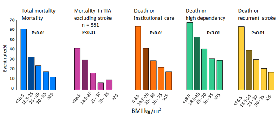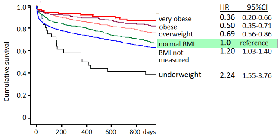Stroke Patients Have a Greater Chance of Survival and Better Outcomes When Overweight
Editor's Note: This is based on Doehner W, Schenkel J, Anker SD, Springer J, Audebert HJ. Overweight and obesity are associated with improved survival, functional outcome, and stroke recurrence after acute stroke or transient ischaemic attack: observations from the TEMPiS trial. Eur Heart J 2013;34:268-77.1
Stroke patients who are overweight or obese die less often and suffer fewer disabilities than those with an ideal body weight. This is revealed by a new study at the Charité – Universitätsmedizin Berlin, Germany and published in the European Heart Journal.1 This seemingly paradoxical correlation between body weight and outcome, which is also known as the obesity paradox, has been observed in the past in association with several other chronic conditions such as heart failure, COPD, chronic renal failure, and others. This newly published study demonstrates that the obesity paradox also holds true for strokes. The study confirms previous reports on the relation of body weight and mortality in stroke patients.2,3 Moreover, it has been shown that besides mortality, also non-fatal outcomes after stroke – such as degree of functional disablement – are as well inversely associated with body weight. According to the current study, underweight individuals have the worst outcomes after stroke.
In their study, the researchers investigated the relationship between body weight and the consequences on outcomes of stroke. The study is based on a post hoc analysis from data of 1,521 patients enrolled in the TEMPiS project, a multicenter interventional trial in patients admitted to emergency units for acute stroke or transient ischaemic attack (TIA). The TEMPIS project, led by H. Audebert, compared acute Stroke Unit based care with telemedicine support against regular care of acute stroke or TIA. For the present analysis, patients were categorized according to the body mass index in underweight (BMI <18.5 kg/m2), normal (BMI 18.5 to <25) overweight (BMI 25 to <30), obesity (BMI 30 to <35), advanced obesity (BMI ≥35 all kg/m2), and those with no body weight assessed. Outcome variables included all-cause mortality and non-fatal outcomes at 30 months: functional impairment (defined as Barthel index <60, or modified Rankin score >3), need for institutional care, and recurrent stroke.The authors found that overweight individuals were more likely to survive a stroke and suffer fewer disabilities and require less care than people of normal weight after having a stroke. Mortality risk was lower in overweight patients [hazard ratio (HR): 0.69, 95% confidence interval (CI): 0.56–0.86) and lowest in obese (HR: 0.50, 95% CI: 0.35–0.71) and very obese patients (HR: 0.36, 95% CI: 0.20–0.66] compared with normal BMI. Event rates for all outcome measures followed the same inverse pattern: underweight patients had the worst outcomes but obese patients had better outcomes than patients with normal BMI (Figure 1). Moreover, although the risk of actually having a first-ever stroke may have been higher for overweight people than for those of normal weight, overweight individuals who have already suffered a stroke were not at higher risk of having another stroke.
In their analyses, the authors adjusted for relevant confounding factors including age, sex, stroke severity, living in partnership prior to the event, relevant co-morbidities, classification of the cerebral event (TIA vs. ischaemic stroke vs. intracerebral haemorrhage), and also for assignment to the Telestroke Unit or conventional treatment arm of the TEMPiS study protocol. In this multivariable analysis, obese patients had a lower risk of the combined endpoints of death or institutional care (OR: 0.60, 95% CI: 0.38–0.92), death or high dependency (OR: 0.60, 95% CI: 0.39–0.91) and death or recurrent stroke (OR: 0.56, 95% CI: 0.37–0.86). Mortality was significantly lower in obese patients (all BMI >30 kg/m2) than patients with normal weight (HR: 0.70; 95% CI: 0.50–0.98). Underweight patients had consistently the highest risks for all endpoints.
Principal authors W. Doehner and H. Audebert from the Center for Stroke Research Berlin at the Charité state: "These findings are new for stroke patients." The current treatment guidelines in Germany, Europe and the USA have hitherto recommended that patients who are overweight or obese should lose weight after suffering a stroke. However, these recommendations are based on "expert opinions" ("Evidence level C") that rely on translation of knowledge gained from primary prevention (i.e., from an otherwise healthy normal population). The researchers consider the results of this study should make us more careful in recommending stroke patients to lose weight after a first stroke. While avoidance of overweight will doubtlessly help to prevent a wide range of metabolic and cardiovascular disease in primary prevention, the findings from the study address those subjects who suffered already a severe cerebrovascular event. The data support the concept of a stronger differentiation between body weight management in patients with established disease as compared to primary prevention.The authors emphasize that the reported data result from a post hoc analysis with all the limitations inherent to such analyses (e.g., not adjusting the results for possibly important co-factors like smoking or concomitant malignant diseases). In addition, they cannot provide insight in the consequences of a change in body weight on long term. Prospective data on the influence of weight and weight change on outcome after a stroke occurred are warranted and are, in fact, accumulating in ongoing clinical trials at the Center for Stroke Research Berlin, Germany.
References
- Doehner W, Schenkel J, Anker SD, Springer J, Audebert HJ. Overweight and obesity are associated with improved survival, functional outcome, and stroke recurrence after acute stroke or transient ischaemic attack: observations from the TEMPiS trial. Eur Heart J 2013;34:268-77.
- Olsen, TS, Dehlendorff, C, Petersen, HG, Andersen, KK. Body mass index and poststroke mortality. Neuroepidemiology 2008; 30:93-100.
- Vemmos K, Ntaios G, Spengos K, Savvari P, Vemmou A, Pappa T, Manios E, Georgiopoulos G, Alevizaki M. Association between obesity and mortality after acute first-ever stroke: the obesity-stroke paradox. Stroke 2011;42:30-36.
Keywords: Stroke, Obesity, Overweight, Risk Factors
< Back to Listings


